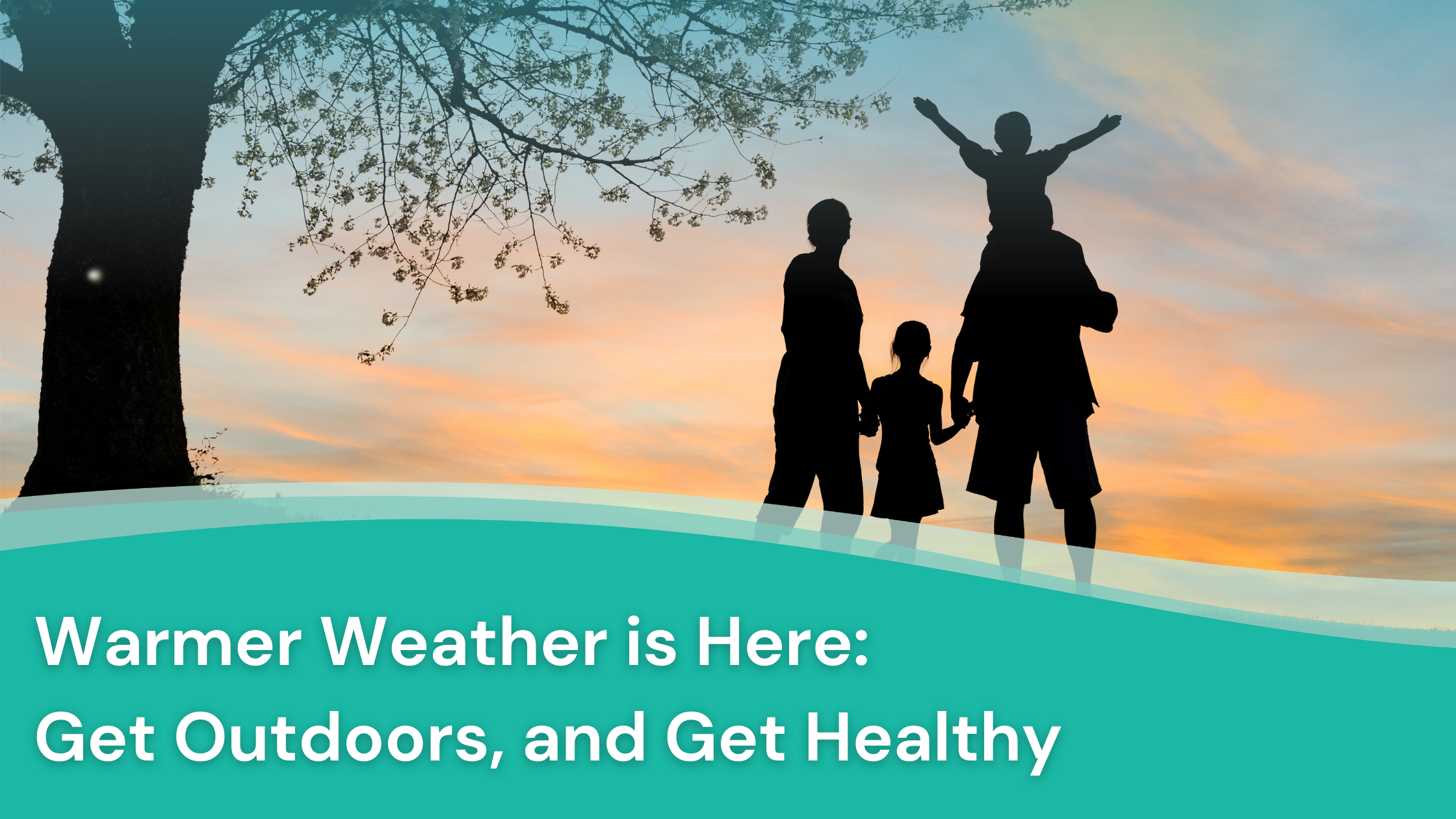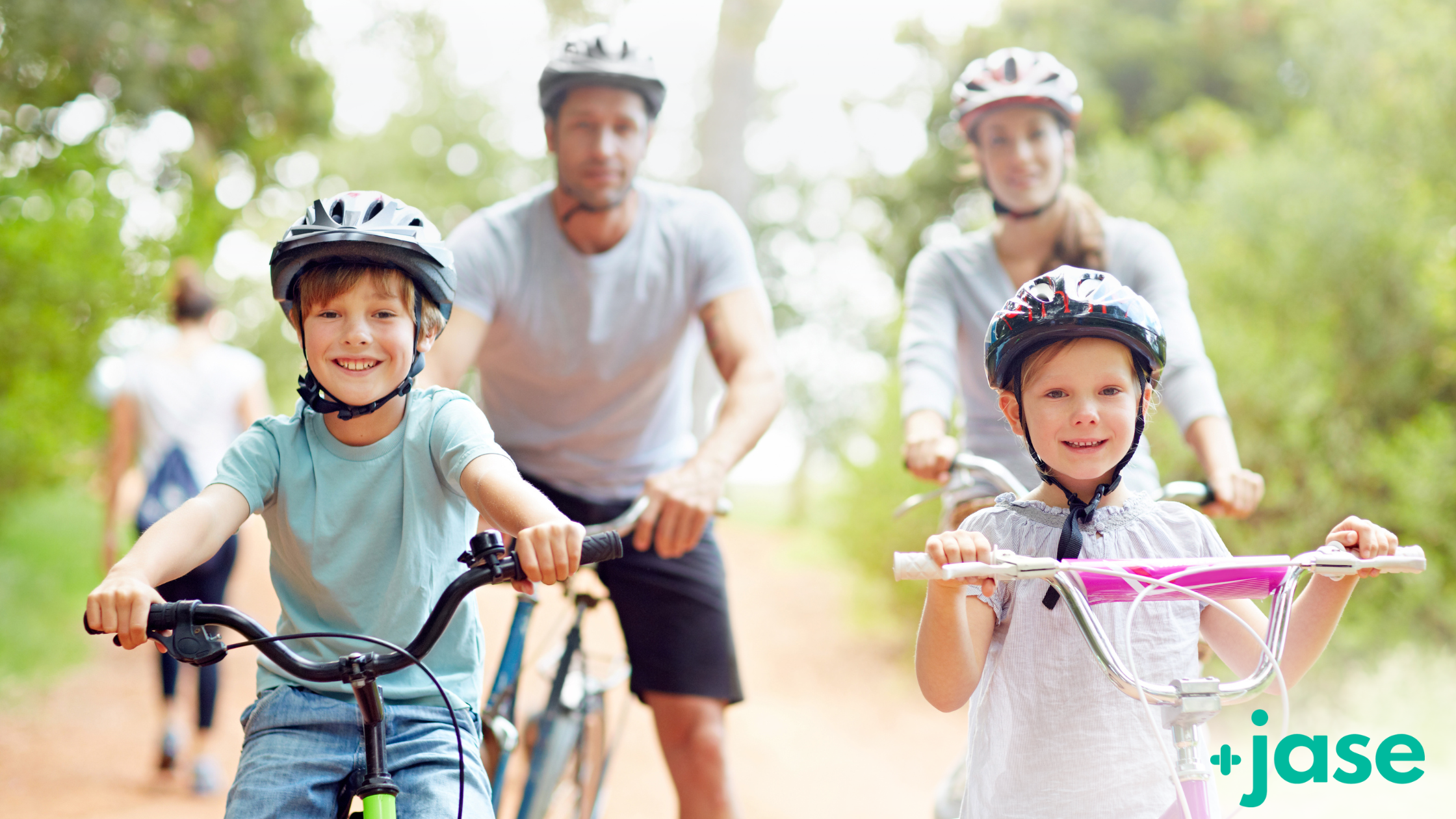
An active family is a healthy family, and a healthy family is a happy one.
.
Stay healthy by getting outside, and stay safe while doing so.
The sun is shining, the birds are chirping, and a gentle breeze is calling you outdoors! As this season graces us with its warmth and the days grow longer, it’s the perfect time to venture out with your loved ones, and soak in some vitamin D.
Whether you’re planning a leisurely afternoon in the backyard or a grand family reunion, the great outdoors offers a treasure trove of fun, adventure, and unforgettable memories. These activities offer a host of health benefits, from physical fitness to mental well-being as well as fostering a connection to the environment.
So, let’s explore some exciting outdoor activities that will keep the whole family entertained while reaping the health benefits of fresh air, sunshine, and physical movement.
Outdoor activities for the whole family.
Hit the Trails: Hiking is a fantastic way to explore nature, get some exercise, and breathe in the fresh air. Choose a trail suited to your family’s fitness level, and don’t forget to pack plenty of water and snacks.
Wheely Good Times: Biking is a low-impact activity suitable for most ages and fitness levels. Explore your neighborhood on a scenic route or pack a picnic lunch and head to a local park.
Park Playtime: Head to your local park for a fun-filled day. Pack a frisbee or a ball for some classic games, like frisbee tic-tac-toe, or explore the playground equipment. Many parks also offer features like biking or walking paths, perfect for getting some exercise while enjoying the scenery. Time Magazine suggests that as little as 20 minutes in a park can make you happier.
Skateboarding or Rollerblading: These activities can be great for family fun in suitable parks or trails that accommodate skateboards and rollerblades.
Backyard Bonanza: Transform your backyard into an adventure zone! Pitch a tent for a night of stargazing, set up an obstacle course with hula hoops, jump ropes, and tunnels, or create a fairy garden for the little ones.
Geocaching: Geocaching is a real-world, outdoor treasure hunting game using GPS-enabled devices. Participants navigate to a specific set of GPS coordinates and then attempt to find the geocache (container) hidden at that location.
Splish Splash! With the rising temperatures, water activities become a cool way to beat the heat. Head to the beach for a day of sandcastle building and swimming, or visit a splash pad for some refreshing fun. Consider geocaching for a treasure hunt adventure with a watery twist – look for waterproof geocaches hidden near lakes, rivers, or beaches!
Kayaking or Canoeing: If you’re near a body of water, kayaking or canoeing can be a peaceful and invigorating way to explore lakes, rivers, or coastal areas. Rentals are often available if you don’t own a kayak or canoe.
Cast a Line: Fishing is a great way to spend a quiet afternoon outdoors and can teach patience and respect for nature. It’s also a fun way to introduce kids to a new hobby and enjoy a delicious home-cooked meal with your fresh catch!
Bird Watching: Bird watching is a calming activity that can be done in virtually any outdoor setting, including your own backyard. It’s a good way to teach children about nature and wildlife.
Rock Climbing: For families with older children, rock climbing can be an exciting challenge. Outdoor climbing walls or natural rock formations with guided climbs are a safe way to try this sport.
Outdoor Yoga: Practicing yoga in a park or a quiet, scenic area can enhance the experience by connecting you more deeply with nature.
Why do all this you may ask? Because it’s good for you! How good? Read on to find out:
Health Benefits of outdoor activities:
- Physical Fitness: Many outdoor activities, such as hiking, cycling, kayaking, and rock climbing, provide excellent cardiovascular exercise, helping to strengthen the heart, improve circulation, and boost overall fitness levels. Not everyone can be up for the same outings, so be sure to choose the right amount of physical activity for different age groups.
- Muscle Strength and Flexibility: Activities like gardening, rock climbing, and skateboarding work various muscle groups, enhancing strength, flexibility, and coordination.
- Mental Well-being: Outdoor activities offer mental health benefits, including reduced stress, anxiety, and depression. Being in nature can improve mood and mental clarity, promoting a sense of well-being.
- Social Interaction: Activities like picnics, geocaching, and group sports promote social bonding and interaction, which are vital for mental and emotional health.
- Cognitive Benefits: Engaging in activities that require problem-solving, such as geocaching or rock climbing, can improve cognitive function and enhance skills like focus and decision-making.
- Vitamin D Absorption: Spending time outdoors allows the body to absorb vitamin D from sunlight, which is essential for bone health and immune function. Sunlight has been linked to increased serotonin levels, and better moods!
- Stress Reduction: Being in natural environments has been shown to reduce cortisol levels, the hormone associated with stress, leading to a more relaxed state of mind.
- Improved Sleep: Regular outdoor activity can help regulate sleep patterns, leading to better quality sleep and increased energy levels during the day.
- Emotional Well-being: Outdoor activities can provide a sense of accomplishment, adventure, and excitement, contributing to overall emotional well-being.
- Family Bonding: Participating in outdoor activities as a family fosters strong bonds and creates lasting memories, promoting a sense of unity and connection.
But remember, stay safe while staying healthy!

Sun exposure, dehydration, and heat exhaustion are the easiest things to neglect thinking about when everyone is having fun, and no one wants a day ruined by a health related issue.
Preparing for these and the other health related concerns should be a part of your planned day outdoors.
Here are some things to remember the risks of while having the time of your lives:
Dehydration: Prolonged outdoor activity, especially in hot weather, can lead to dehydration. To prevent this, drink plenty of water before, during, and after your activity. Avoid sugary drinks and alcohol, as they can dehydrate you further. Dehydration occurs more easily in young children and especially in older adults, with as much as 28% of older adults affected by dehydration.
Sunburn: Exposure to the sun’s UV rays can cause sunburn, which increases the risk of skin cancer. Use a broad-spectrum sunscreen with an SPF of at least 30, and reapply every two hours or after swimming or sweating. Wear protective clothing, such as hats and sunglasses, and seek shade during peak sun hours.
Heat Exhaustion and Heatstroke: High temperatures can lead to heat-related illnesses, such as heat exhaustion and heatstroke. Stay hydrated, wear lightweight and light-colored clothing, and take frequent breaks in shaded or cool areas. Learn the signs of heat-related illnesses and seek medical attention if you or a family member experiences symptoms such as dizziness, nausea, or rapid heartbeat.
Air Quality: Pay attention to air quality reports, especially on high pollution days. Avoid exercising outdoors during times of poor air quality, as it can exacerbate respiratory issues.
Asthma Management: If you or a family member has asthma, take extra precautions during outdoor activities. Ensure that asthma medications, such as inhalers, are readily available and use them as prescribed. Consult with a healthcare provider to develop an asthma action plan tailored to outdoor activities.
Insect Bites and Tickborne Diseases: Outdoor activities can expose you to insect bites and the risk of tick-borne diseases like Lyme disease. Use insect repellent containing DEET, wear long sleeves and pants in wooded areas, and perform thorough tick checks after outdoor activities. If you find a tick, remove it carefully with tweezers.
Allergies: Pollen, plants, and insect stings can trigger allergic reactions in some individuals. If you or a family member has allergies, carry necessary medications (e.g., antihistamines, epinephrine) and be aware of potential allergens in the outdoor environment.
Injuries: Outdoor activities, particularly those involving physical exertion or equipment (e.g., cycling, rock climbing), can lead to injuries such as sprains, strains, or fractures. Use appropriate safety gear, follow proper techniques, and know your limits. Seek medical attention for serious injuries.
Water Safety: When engaging in water activities like swimming or kayaking, always wear a life jacket, even if you’re a strong swimmer. Be aware of water currents, hidden hazards, and water quality. Supervise children closely around water.
Wildlife Encounters: In areas with wildlife, such as parks or hiking trails, respect their space and do not approach or feed them. Be aware of your surroundings and know how to respond if you encounter wildlife. Keep food securely stored to avoid attracting animals.
Weather Hazards: Be prepared for changes in weather conditions. Check the forecast before heading outdoors and bring appropriate clothing and gear. Avoid outdoor activities during severe weather conditions such as thunderstorms or extreme heat.
Safety Gear: Use appropriate safety gear for each activity, such as helmets for cycling and rock climbing, to reduce the risk of injury. Check equipment regularly for wear and tear.
Taking precautions for the safety of all these activities will help ensure that everyone has a great time outdoors, and no one comes home with a new injury or negative experience.
Being prepared is always better.
Our Jase Case, and Kid Case are perfect to have on hand to stave off concerns of some of these risks, and treat them if they do happen. Allergies, skin irritations, tick-borne diseases, and asthma management are just a few of the things the medications in a Jase Case can treat.
A great day outdoors can make memories that last a lifetime. Make them good memories.
Order your Jase Case today
Lifesaving Medications
Recent Posts
Keeping you informed and safe.
Medical Readiness: What Really Kills First
When Disaster Strikes, It’s Not Hunger or Thirst That Takes the First Lives In every disaster zone, from hurricanes in the Caribbean to war zones in Ukraine, the pattern is the same. People worry about food and water, but it’s infection that kills first. A small wound...
Exploring Dr. William Makis’ Hybrid Orthomolecular Cancer Protocol: Focus on Ivermectin and Mebendazole/Fenbendazole
Exploring Dr. William Makis’ Hybrid Orthomolecular Cancer Protocol: Focus on Ivermectin and Mebendazole/Fenbendazole *Disclaimer: This article is for educational purposes and does not constitute medical advice. Always seek professional guidance.* In the evolving...
Be Prepared for Life’s Unexpected Moments
3 Reasons EVERYONE should have emergency medications avaiable. It's all about access—access to medications and care when you need it most. And when things happen outside of your control that access can disappear.Below are 3 examples of how easily this access can be...
Youth Preparedness: Teaching, Building, and Coping with Disasters
Educating and preparing your children ahead of time means fewer surprises in the event of an emergency.Growing Up Prepared: Empowering Youth in Disaster Preparedness As we observe National Preparedness Month, it's crucial to remember that disasters can strike at any...





